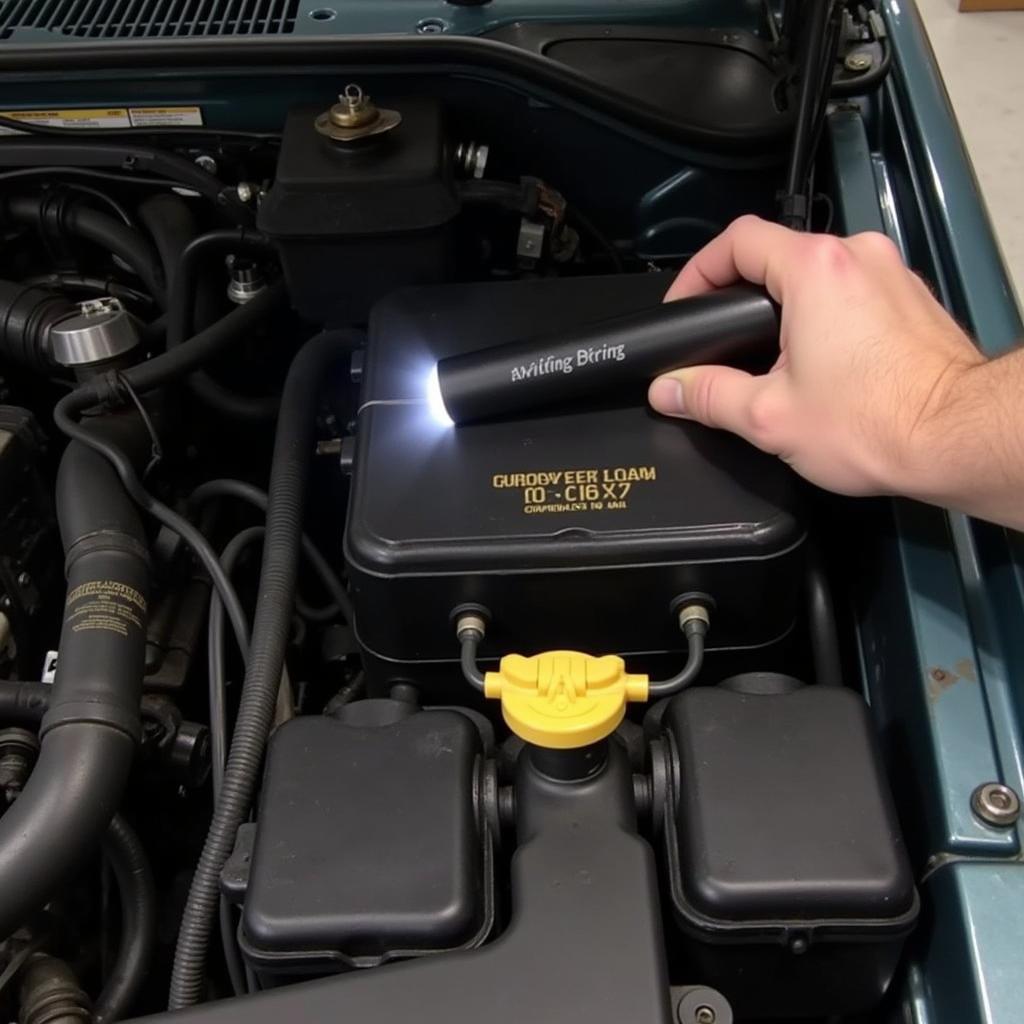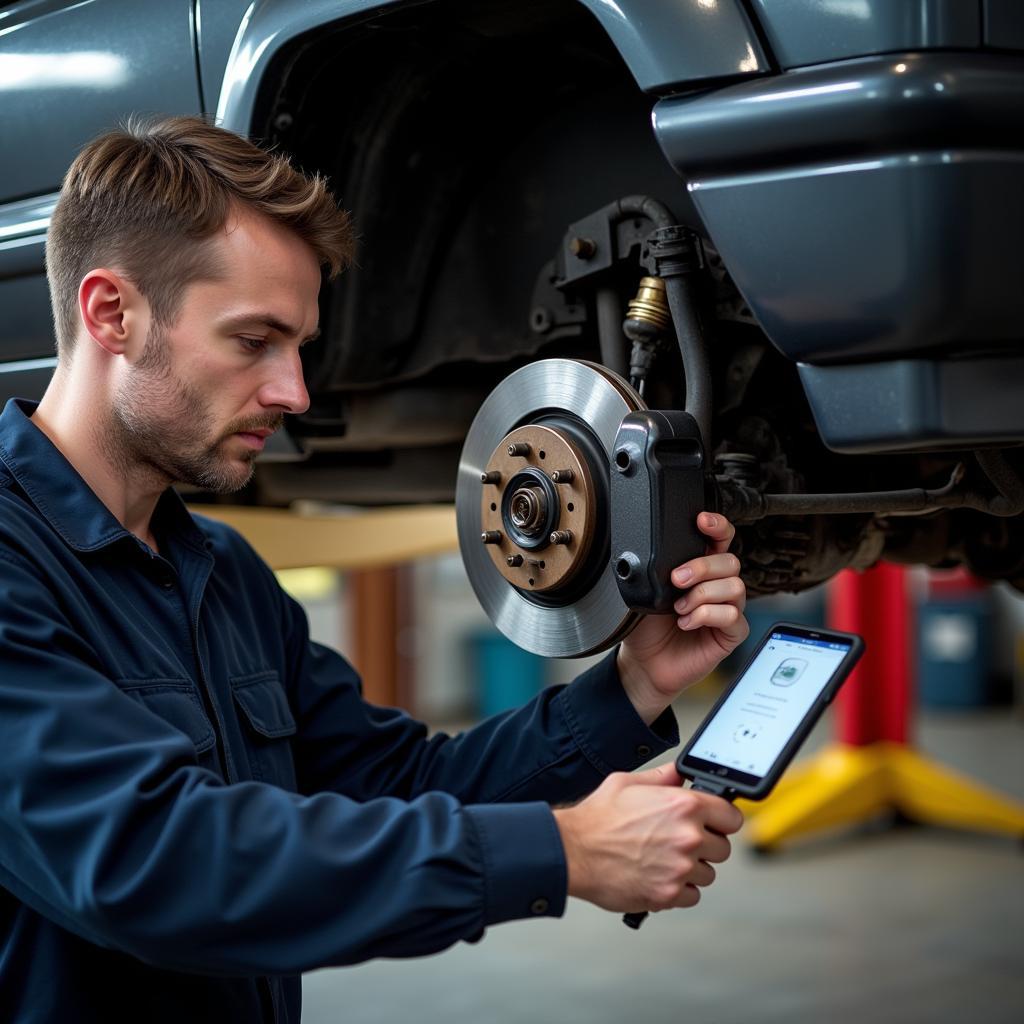The 1999 Jeep Cherokee brake warning light can illuminate for several reasons, ranging from simple fixes like low brake fluid to more complex issues like a faulty ABS system. Understanding these causes and how to address them is crucial for maintaining your vehicle’s safety and performance. This guide will delve into the common culprits behind the illuminated brake light in your 1999 Jeep Cherokee and equip you with the knowledge to diagnose and potentially fix the issue yourself. We will also cover when it’s absolutely necessary to seek professional assistance.
For many Jeep Cherokee owners, seeing that persistent brake warning light can be a source of anxiety. Don’t panic! Often, the fix is simpler than you might think. However, ignoring this warning signal can lead to serious braking problems down the road. So, let’s dive into the most common reasons why your 1999 Jeep Cherokee brake warning light might be on.
Common Causes of a 1999 Jeep Cherokee Brake Warning Light
There are several potential reasons for your 1999 Jeep Cherokee’s brake warning light to activate. Here are the most frequent culprits:
- Low Brake Fluid: This is the most common and easiest to fix. Over time, brake fluid levels can decrease due to normal wear and tear. Low brake fluid can significantly compromise your braking power.
- Worn Brake Pads: Brake pads are designed to wear down. When they reach a certain point, a sensor will trigger the warning light.
- Faulty Brake Light Switch: This switch is responsible for activating your brake lights when you press the pedal. If it malfunctions, it can also trigger the brake warning light.
- ABS Issues: The Anti-lock Braking System (ABS) is a crucial safety feature. If a problem arises within the ABS, the warning light will illuminate. This could be due to a faulty sensor, wiring issue, or a problem with the ABS module itself.
- Parking Brake Engaged: Sometimes, the simplest solution is the right one. Ensure your parking brake is fully disengaged.
 Checking Brake Fluid in a 1999 Jeep Cherokee
Checking Brake Fluid in a 1999 Jeep Cherokee
After checking your parking brake, if it’s still engaged, it’s likely a cable issue. You can check jeep brake warning light stays on for further information.
Diagnosing the Problem
Identifying the specific cause of the brake warning light requires a systematic approach.
-
Check the Parking Brake: Ensure it’s fully disengaged.
-
Inspect Brake Fluid Level: If the fluid is low, add the correct type of brake fluid as specified in your owner’s manual.
-
Examine Brake Pads: Visually inspect your brake pads for wear. If they appear thin, it’s time for a replacement.
-
Test Brake Light Switch: If the brake lights aren’t working, the switch might be the culprit. You can test this with a multimeter or by having someone observe the brake lights while you press the pedal.
-
Seek Professional Help for ABS Issues: Diagnosing and repairing ABS problems requires specialized tools and expertise. If you suspect an ABS issue, it’s best to consult a qualified mechanic. You might find some useful information on 1999 jeep grand cherokee brake warning light.
When to Seek Professional Help
While some issues can be resolved with simple DIY fixes, others require professional attention. If you’ve checked the basics and the light remains on, or if you suspect an ABS problem, it’s time to consult a qualified mechanic. Don’t delay, as ignoring the problem could lead to more serious and costly repairs down the line.
What if the light flickers intermittently?
A flickering brake light can indicate a loose connection, a failing sensor, or a wiring problem.
Could a bad alternator cause the brake light to come on?
While less common, a faulty alternator can sometimes indirectly cause the brake warning light to illuminate.
 Professional Brake System Inspection on a 1999 Jeep Cherokee
Professional Brake System Inspection on a 1999 Jeep Cherokee
How often should I check my brake fluid?
It’s a good practice to check your brake fluid level at least once a month.
“Regular brake system maintenance is crucial for safety,” says John Miller, a certified automotive technician with over 20 years of experience. “Addressing warning lights promptly can prevent minor issues from escalating into major problems.”
Conclusion
The 1999 Jeep Cherokee brake warning light serves as a vital safety indicator. Addressing it promptly and correctly is essential for maintaining your vehicle’s braking performance and ensuring your safety on the road. By understanding the common causes and following the diagnostic steps outlined in this guide, you can effectively troubleshoot the issue. However, remember that complex problems like ABS malfunctions require professional expertise. Don’t hesitate to consult a qualified mechanic if you’re unsure about the cause or how to fix it. A proactive approach to brake maintenance will keep your 1999 Jeep Cherokee running safely and smoothly for years to come.
“Remember,” adds Sarah Johnson, lead mechanic at Johnson Auto Repair, “Ignoring a brake warning light can have serious consequences. It’s always better to be safe than sorry when it comes to your brakes.”
FAQ
- What does the 1999 Jeep Cherokee brake warning light mean? It signals a potential problem within your braking system.
- Can I drive my Jeep Cherokee with the brake warning light on? It’s not recommended, as it indicates a potential safety issue.
- How much does it cost to fix a 1999 Jeep Cherokee brake warning light issue? The cost varies depending on the underlying cause.
- How can I prevent my 1999 Jeep Cherokee brake warning light from coming on? Regular brake system maintenance is key.
- What type of brake fluid should I use in my 1999 Jeep Cherokee? Refer to your owner’s manual for the correct type.
- Is it safe to check my brake fluid myself? Yes, as long as you follow proper safety precautions.
- How often should I replace my Jeep Cherokee’s brake pads? It depends on your driving habits, but typically every 30,000 to 70,000 miles.

